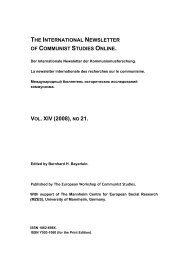11RXNdQ
11RXNdQ
11RXNdQ
Create successful ePaper yourself
Turn your PDF publications into a flip-book with our unique Google optimized e-Paper software.
Colonialism is a System* 11<br />
precisely one of outlets … Where there is political predominance, there is also<br />
predominance in products, economic predominance.<br />
So you see, it was not Lenin who first defined colonial imperialism; it was Jules Ferry,<br />
that ‘great figure’ of the Third Republic.<br />
And you also see that this minister is in agreement with the fellagha 2 of 1956: he<br />
proclaimed ‘politics first!’ which they were to take up against the colonists three-quarters<br />
of a century later.<br />
First of all overcome resistance, smash the framework, subdue, terrorize. Only then will<br />
the economic system be put in place.<br />
And what does this consist of? The creation of industries in the conquered country? Not<br />
at all; the capital with which France ‘is awash’ will not be invested in under-developed<br />
countries; the returns would be uncertain, the profits would be too long in coming;<br />
everything would have to be built, equipped. And, even if that could be done, what would<br />
be the point in creating competition for production in France? Ferry is very clear: capital<br />
will not leave France, it will simply be invested in new industries which will sell their<br />
manufactured products to the colonized country. The immediate result<br />
2 Freedom fighter, member of the Algerian National Liberation Front (FLN).<br />
was the establishment of the Customs Union (1884). This Union still exists: it ensures that<br />
France’s industry, handicapped in the international market by prices that are too high, has<br />
a monopoly over the Algerian market.<br />
But to whom then did this new industry expect to sell its products? The Algerians?<br />
Impossible: where would they have got the money from to pay? The concomitant of this<br />
colonial imperialism is that spending power has to be created in the colonies. And, of<br />
course, it is the colonists who will benefit from all the advantages and who will be turned<br />
into potential buyers. The colonist is above all an artificial consumer, created overseas<br />
from nothing by a capitalism which is seeking new markets.<br />
As early as 1900, Peyerimhoff stressed this new feature of ‘official’ colonization:<br />
‘Directly or not, the property of the colonist has come to him gratis from the State or he<br />
has seen concessions granted around him on a daily basis. Before his eyes the government<br />
has made sacrifices for individual interests considerably greater than those it would<br />
consent to in older fully developed countries.’<br />
Here the second side of the colonial diptych appears clearly: in order to be a buyer, the<br />
colonist must be a seller. To whom will he sell? To the people of mainland France. And<br />
what can he sell without an industry? Food products and raw materials. This time, under<br />
the aegis of Minister Ferry and the theoretician Leroy-Beaulieu, colonial status is<br />
established.<br />
And what are the ‘sacrifices’ that the State makes to the colonist, to this man, the<br />
darling of gods and exporters? The answer is simple: it sacrifices the property of the<br />
Muslims to him.<br />
Because it so happens that, in fact, the natural produce of the colonized country grows<br />
on the land and that this land belongs to the ‘indigenous’ population. In certain thinly<br />
populated regions, with large uncultivated areas, the theft of land is less apparent: what




